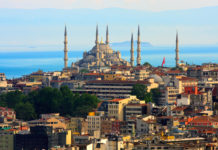
Mustafa Al-Saffar is a sports coach based in Dundee, Scotland.
Sports coach Mustafa Al-Saffar says that Muslim athletes can achieve peak performance while fasting in Ramadan.
The question of whether athletes should fast during the month of Ramadan whilst playing sport is one that I have been thinking about for a while now.
Every year the same questions arise regarding the well-being of Muslim athletes who compete at high levels. How will they manage? Is that even possible? Not even water?
Muslim athletes such as Mesut Özil, Paul Pogba, Mo Farah, Amir Khan, Mohamed Sbihi, Abdul Buhari, Moeen Ali, Sonny Bill Williams and greats such as the late Muhammad Ali, are (and were) asked about performance and fasting – as if the two are incompatible…
Fasting and faith
Subscribe to our newsletter and stay updated on the latest news and updates from around the Muslim world!
To begin with, let’s understand what the purpose of fasting in the month of Ramadan is, and why Muslim athletes should look forward to this month as it helps boost performance – on and off the field.
The Islamic faith encourages its followers to be in the best possible physical and mental shape at all times. In the 9th month of the Islamic calendar – a lunar calendar – healthy Muslims undergo a unique form of training: fasting.
This entails giving up food and water, among other things, from sunrise until sundown for one month. Now remember, this is only for the fit and able Muslim; so if you are sick, pregnant or travelling long distances etc, you are, of course, exempt from fasting.
This is something personal between the athlete and their God.
Elite athletes
Now what about the top athletes? How can they fast when their job demands that they work at high and intense levels, and often travel abroad, e.g. to the current European Football Championships?
If an athlete feels like they can fast whilst playing, why shouldn’t they?

Athletes such as Hakeem Olajuwon fasted during his NBA career – even during one NBA final – and claimed that his play improved.
Nathan Elleington who played for Wigan, West Brom and other Premier League teams, also fasted whilst playing and said: “I never had a problem with my game during Ramadan.”
One of the most important benefits of the month of Ramadan is to help the athlete with their mental skills. The Muslim mind is trained to focus and resist distraction from all angles – something most professional athletes struggle with.
The Muslim athlete is reminded to be thankful for what they have and to focus on the positive aspects of life. They will develop a habit over 30 days which allows them to gain control over their mind, and learn to tune out negative perceptions which can hinder performance.
Diet and sacrifice
It’s no secret that not eating or drinking during the day will impact performance. Any professional athlete will know the importance of maintaining a healthy body and eating well, especially pre and post training/games.
 Although abstaining from food and drink may not be optimal for a Muslim athlete competing throughout the month of Ramadan, that doesn’t mean that they are unable to achieve peak performance, or that they cannot compete at all. It simply means that they will have to establish a new eat/drink/sleep cycle for that month.
Although abstaining from food and drink may not be optimal for a Muslim athlete competing throughout the month of Ramadan, that doesn’t mean that they are unable to achieve peak performance, or that they cannot compete at all. It simply means that they will have to establish a new eat/drink/sleep cycle for that month.
A Muslim athlete during the month of Ramadan begins to think about clever ways to minimise loss of body water, and ensures that they eat enough calories to help with the following day.
Whilst some people may think that this method deteriorates performance, that view is completely contrary to the way Muslims think about it..
Psychologically, the month of Ramadan actually reminds and trains the Muslim about the importance of serving others, and the importance of sacrifice for the sake of others (what we call true teamwork).
And as a coach, I will tell you that I would love to have players who are willing to sacrifice for one another for that is an essential trait in any successful athlete.
Ramadan mind-set
Top athletes must have a strong mind-set; a mind-set for success. They must be able to handle the many struggles, challenges and obstacles that their sport will offer, and the month of Ramadan offers rigorous training and preparation for this.
The ability to abstain from food and water, when you want it, can be extremely difficult. The strong self-discipline, patience and desire to persevere during the day equip the Muslim athlete with the necessary tools to deal with other challenges within their game, for example patience in dealing with injuries or recovery and bouncing back after a loss.
Ramadan helps the athlete increase in their self-esteem after they have achieved their day-to-day results, which in turn will allow their confidence to grow, and their ability to welcome bigger challenges on the field.
Team GB rower Mohamed Sibhi actually managed to match his personal best whilst fasting. He said: “Every year people expect my performance to dip but, actually, I’ve matched my personal best. For me, fasting is a challenge and maybe one that has made me aim to perform even better.”
Although I have much more to say on this topic, I just wanted to start a new and more positive trend when we talk about Muslim athletes in the month of Ramadan. Let’s move away from talking about the difficulties of not eating or drinking, and set the standard higher.
Muslim athletes benefit greatly from this month and aim to achieve higher goals when their one-month-training is finished. For these reasons, I truly believe that it’s the best time to achieve peak performance.
It’s not about the number of hours you have to fast per day. It’s about how you spent those hours while fasting.










![24 Hour Road Trip Through Free Syria [Short Film]](https://5pillarsuk.com/wp-content/uploads/2025/02/IMG_5907-218x150.jpg)











